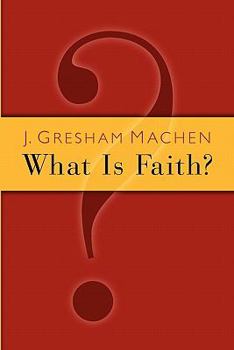What Is Faith?
Select Format
Select Condition 
Book Overview
Machen addresses one of the most fundamental questions about the Christian gospel. In his graceful style he expounds the biblical teaching on faith. This description may be from another edition of this product.
Format:Paperback
Language:English
ISBN:0802811221
ISBN13:9780802811226
Release Date:August 1946
Publisher:William B. Eerdmans Publishing Company
Length:264 Pages
Weight:0.65 lbs.
Dimensions:0.6" x 5.3" x 8.0"
Customer Reviews
4 ratings
What Is Faith? By Machen
Published by Thriftbooks.com User , 16 years ago
An excellent presentation of the Orthodox Christian Faith, something that is becoming a rare comodity in this age of Apostacy, an age were many just want their ears tickled instead of hearing God's Word of truth.
Faith then comes Love.
Published by Thriftbooks.com User , 17 years ago
In the introduction to this text, J. Gresham Machen discusses the need to know things, to know facts, to know view points, before someone can think. A person cannot make educated conclusions without being educated. One cannot form ideas or arguments unless one knows the details that help formulate the thought or the arguments of other individual. Upon what study, what exploration does someone come to a conclusion. One must be able to discern between one's own conclusion, another person's conclusion, and absolute truth. Ideas are formed through emotion, cliche arguments, and utility. It is easy to come to a conclusion devoid of any understanding of the facts or arguments made. One can use vague references to Christian understanding and come up with a theology of sorts that conflicts with the Bible. Do the facts and arguments stated in the Bible used in the formulation of the person's thinking. What the person believes. Yes what the person has Faith in. What is Faith? I have faith in the person of Jesus Christ. Your Faith is summed up in a creed. What is the object of your Faith. If you say Jesus Christ, is your Faith consistent with the facts stated in the Bible and arguments contained in scripture? Do you choose to ignore what is written in the Bible. How do you perceive God's immanence? Is God the whole, is God the whole of the created, or does God exist external to all created, but perceives all and knows all and controls all? Man needs revelation from God to know absolute truth. God's creation is made up of infinite parts, but God does not make up the whole. He exist independently. J. Gresham Machen makes a distinction between Faith in the Father and Faith in the Son. To know each person of the Godhead and how it relates to you. As a created being that has rebelled against the will of God. One who needs a to be reconciled to the Father through the action of the Son. To believe in the Son and repent for ones sins. To Believe what Jesus taught. To believe man is condemned to hell unless he repents. This is what Jesus taught and what is recorded in the Bible. In the book is a long discussion how modern theologians attempt to avoid this fact. Also is a size-able discussion about Justification, atonement, distinction between works that come forth because of Faith and the incorrect concept that works that aid in a persons salvation (the Books argument). Jesus came to die die so you would not have to pay the consequences of sin. J. Gresham Machen goes through extensive arguments with his postmodern critics.
A definitive book on the the subject of what is THE Faith
Published by Thriftbooks.com User , 25 years ago
I own a first edition of this book. I have read it and referred to it often. It is in my opinion a definitive treatment of the subject of what faith is in the context of THE faith once for all delivered to the saints. Machen writes with theological and practical acumen. His analysis of the Biblical passages referred to are handled with clarity and precision. Yet, this book is surprisingly easy to read. What Is Faith is a "must read" for anyone who doubts or who is challenged by the unbelief of the present hour. Only the Bible itself can gender faith. But, Machen's work on the subject of faith will assist the wavering, the searching or the believingly challenged individual to rest in the facts of Scripture as the foundation for Faith and thereby entering into peace.
What is Faith? Another Classic by J. Gresham Machen
Published by Thriftbooks.com User , 26 years ago
In What Is Faith?, J. Gresham Machen seeks to define the role, nature, and object of the historic Christian faith, as set against that of the contemporary liberal theology of his day. Machen's view was that the liberal versions of faith were not really versions of Christianity at all; they were simply various forms of unbelief. Here is a description of this book by the author himself: "In What Is Faith?, 1925, I tried to combat the anti-intellectualism of the Modernist church--the false separation which is set up between faith and knowledge--and to present the New Testament teaching as to what faith is. That endeavor involved necessarily some treatment of the object of faith, so that the little book contains a brief and summary treatment of considerable portions of Christian doctrine."






